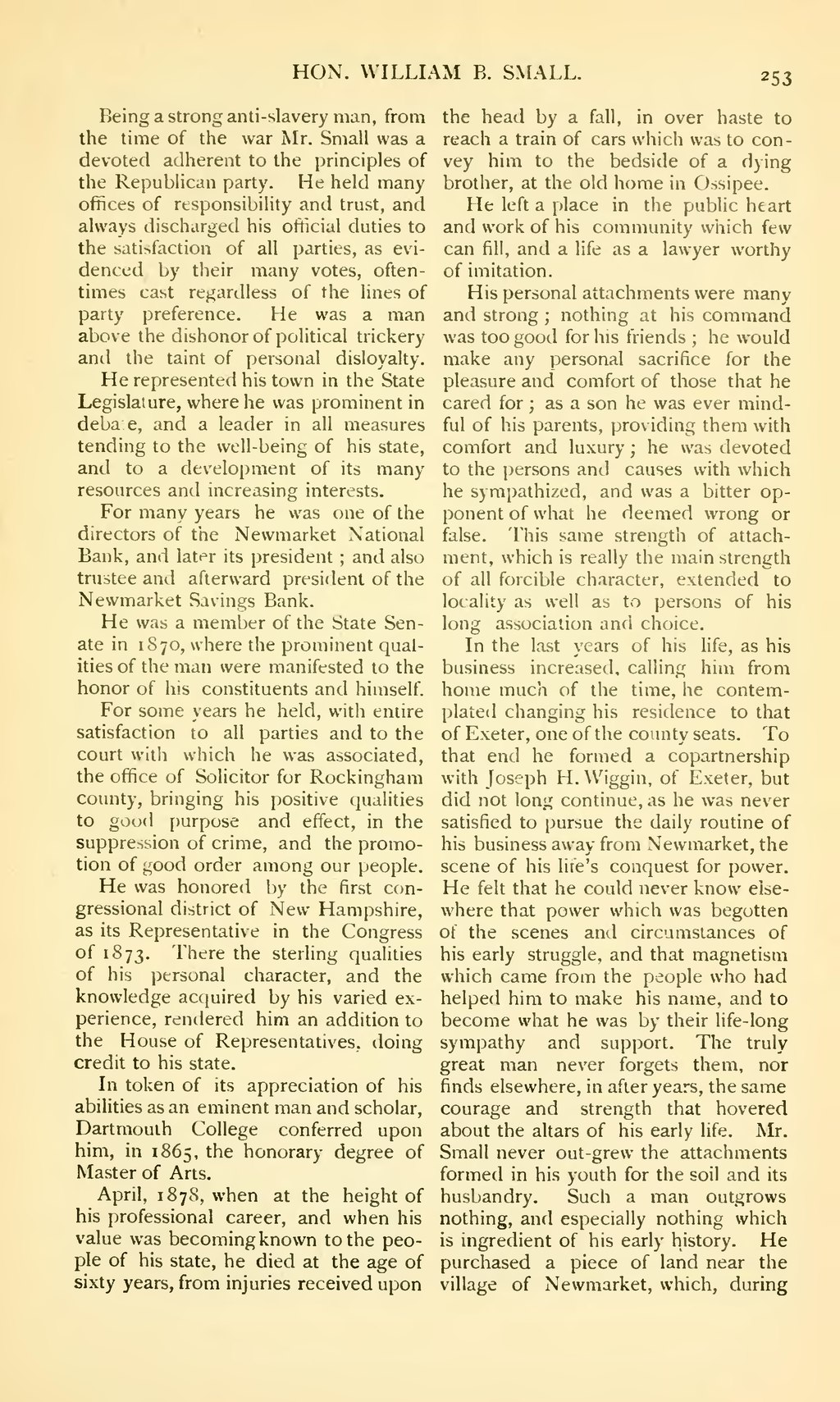HON. WILLIAM B. SMALL.
��2 53
��Being a strong anti-slavery man, from the time of the war Mr. Small was a devoted adherent to the principles of the Republican party. He held many offices of responsibility and trust, and always discharged his official duties to the satisfaction of all parties, as evi- denced by their many votes, often- times cast regardless of the lines of party preference. He was a man above the dishonor of political trickery and the taint of personal disloyalty.
He represented his town in the State Legislature, where he was prominent in deba.e, and a leader in all measures tending to the well-being of his state, and to a development of its many resources and increasing interests.
For many years he was one of the directors of the Newmarket National Bank, and later its president ; and also trustee and afterward president of the Newmarket Savings Bank.
He was a member of the State Sen- ate in 1870, where the prominent qual- ities of the man were manifested to the honor of his constituents and himself.
For some years he held, with entire satisfaction to all parties and to the court with which he was associated, the office of Solicitor for Rockingham county, bringing his positive qualities to good purpose and effect, in the suppression of crime, and the promo- tion of good order among our people.
He was honored by the first con- gressional district of New Hampshire, as its Representative in the Congress of 1873. There the sterling qualities of his personal character, and the knowledge acquired by his varied ex- perience, rendered him an addition to the House of Representatives, doing credit to his state.
In token of its appreciation of his abilities as an eminent man and scholar, Dartmouth College conferred upon him, in 1865, the honorary degree of Master of Arts.
April, 1 8 78, when at the height of his professional career, and when his value was becoming known to the peo- ple of his state, he died at the age of sixty years, from injuries received upon
��the head by a fall, in over haste to reach a train of cars which was to con- vey him to the bedside of a dying brother, at the old home in Ossipee.
He left a place in the public heart and work of his community which few can fill, and a life as a lawyer worthy of imitation.
His personal attachments were many and strong ; nothing at his command was too good for his friends ; he would make any personal sacrifice for the pleasure and comfort of those that he cared for ; as a son he was ever mind- ful of his parents, providing them with comfort and luxury ; he was devoted to the persons and causes with which he sympathized, and was a bitter op- ponent of what he deemed wrong or false. This same strength of attach- ment, which is really the main strength of all forcible character, extended to locality as well as to persons of his long association and choice.
In the last years of his life, as his business increased, calling him from home much of the time, he contem- plated changing his residence to that of Exeter, one of the county seats. To that end he formed a copartnership with Joseph H.Wiggin, of Exeter, but did not long continue, as he was never satisfied to pursue the daily routine of his business away from Newmarket, the scene of his life's conquest for power. He felt that he could never know else- where that power which was begotten of the scenes and circumstances of his early struggle, and that magnetism which came from the people who had helped him to make his name, and to become what he was by their life-long sympathy and support. The truly great man never forgets them, nor finds elsewhere, in after years, the same courage and strength that hovered about the altars of his early life. Mr. Small never out-grew the attachments formed in his youth for the soil and its husbandry. Such a man outgrows nothing, and especially nothing which is ingredient of his early history. He purchased a piece of land near the village of Newmarket, which, during
�� �
